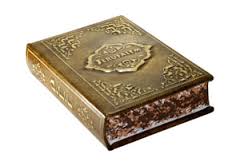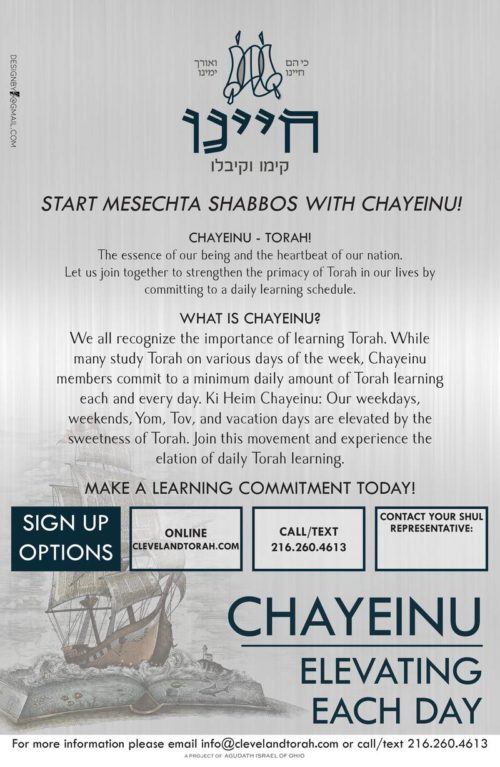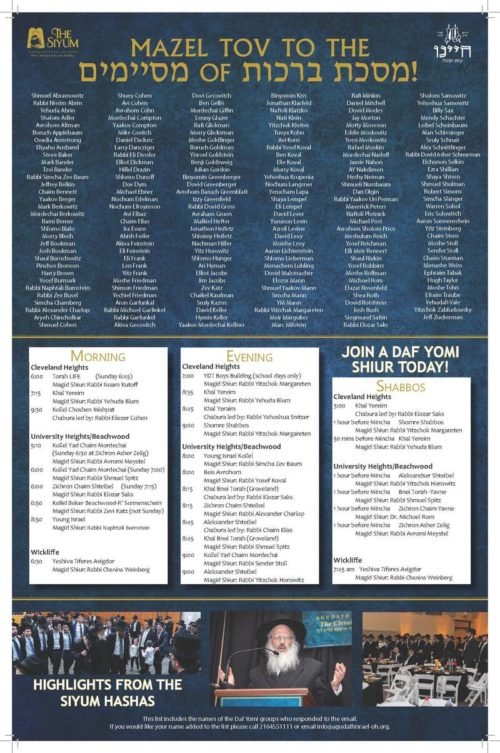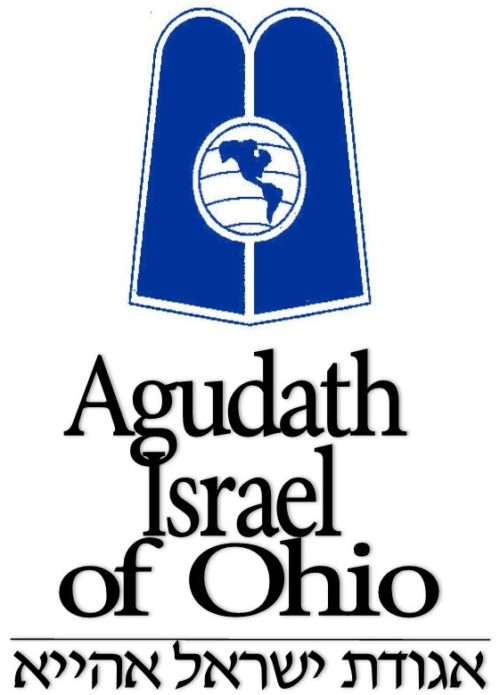 Please daven for BINA BAS CHANA.
Please daven for BINA BAS CHANA.
May we be zocheh to hear b’soros tovos b’korov!
(View the entire Cleveland Community Tehillim List.)
News, Info & Resources for the Cleveland Orthodox Jewish Community
 Please daven for BINA BAS CHANA.
Please daven for BINA BAS CHANA.
May we be zocheh to hear b’soros tovos b’korov!
(View the entire Cleveland Community Tehillim List.)
We find ourselves in challenging times, as the COVID-19 pandemic is disrupting our lives in many ways. School closings and restrictions on our daily social interactions can cause substantial emotional and mental strain on us all.
Along with many other amazing organizations in our city, Naaleh is here to help.
Rabbi Boruch Hirschfeld has offered to share Divrei Chizuk with the community and we will share it with you as soon as it is available.
Additionally, we have asked five mental health and parenting professionals to provide guidance to us in these trying times. Please click on any of these brief (5-10 minute) audio presentations to learn more:
These presentations can also be heard by calling this number:
Dial-in Number: (641) 715-3800
Access Code: 954087
Lastly, in these times of social isolation, people can get lonely. Please consider reaching out to anyone who may benefit from a warm phone call or a friendly text. It goes a long way.
For anyone who needs additional support, or a referral, please call Naaleh at 216-591-6191 ext 103.
May we all have good health,
Rabbi Chaim Helman
Executive Director
The health and safety of our clients, volunteers and staff is our number one priority. In order to limit the germs coming into the cleveland chesed center, we will not be accepting material donations for the time being.
We thank you for your understanding and continuing support. Please stay tuned for updates.
Posted 3/15/2020
Dear members of the Cleveland community,
There is a lot of confusion and concern about the impact of the Coronavirus on the country and in our local community. The disruption of school closures, work changes, and the upcoming Yom Tov of Pesach alone, are cause for worry. We are committed to reacting to these issues and responding as a community. We are all in this together and we will get through this together!
A group of Rabbonim, physicians, non-profit leaders, and others met late last night. We agreed to coordinate a community response and we will need everyone to help us prepare. We are working together with Federation, Gesher, JFSA, Naaleh, Bikur Cholim, Cleveland Chessed Center, Chaveirim, Matan B’Seyser, and others.
As in all things, we are guided by the hadracha of our Poseik, Rav Margareten. We are setting a centralized response and command center in cooperation with the people and organizations listed above. The committee is in formation, if you are able to participate, please contact us asap! There will be a need for many volunteers.
We have set up a dedicated email covid19@agudathisrael-oh.org and phone line 216-848-0379. We need information, any ideas you may have, any problems or concerns you foresee, and help you can provide! Please contact us! There will be many opportunities for us all to pitch in together. If you are able and willing to be involved, let us know. There is also a whatsapp group designed for volunteers to help deliver items that may be needed for those in quarantine etc.
In addition, we are working to quantify what kind of economic disruption may occur in the community. Please fill out and share this survey so that we can help coordinate the appropriate response!
It is extremely important to be familiar with social distancing guidelines from the CDC.
In addition, here is a great resource for how to talk to your children about what is happening: Healthy Children in a Coronavirus World.
In the coming days, we will share more resources via email and through Gesher’s Facebook page @GesherCleveland, about the following issues, among others:
In the meantime, it is worth reviewing this list of FAQ’s. Bear in mind, this is ever-evolving and physicians may change their advice based on changing situations on the ground locally.
How concerned should I be about this virus? Is COVID-19 highly fatal?
Are the responses below intended as blanket rules for all locations and times?
No. They will differ by time and place. The situation is different in Eretz Yisroel than it is in the US and different in Westchester County than Ohio. The general advice below is given for areas in the US that have experienced some cases but have not (yet) reached outbreak status like Westchester County. Use common sense.
Moreover, Orthodox communities are often closely linked. We interact and congregate more frequently than the general population. We are community and family-centered. Thus, it is unrealistic to think that if the virus has afflicted one Orthodox community it will not soon affect other Orthodox communities. It, therefore, behooves members of all Orthodox communities to not only exercise additional caution regarding a contagious disease spreading because it is our religious duty, but because the scientific reality demands it.
Finally, guidance given here is stated as of, and shortly after, its publication. Recommendations may change as the situation progresses.
Is everyone equally at risk?
No. While anyone can contract COVID-19, the elderly are far more vulnerable to the disease. Reports of mortality rates of those under 50 are very low, and there have been no fatalities, and very few severe cases reported in young children. But these rates increase exponentially for every decade after age 50. In addition, those with cardiovascular disease, diabetes, chronic respiratory disease, and some other chronic conditions, are more vulnerable to complications. The recommendations below are for generally healthy people under 50 or 60. Others may wish to take additional precautions.
In light of new recommendations by the health authorities, what additional steps should Orthodox communities be taking to slow the spread of COVID-19?
Social distancing. In addition to not shaking hands, the CDC and local authorities are now recommending that we maintain a healthy distance from each other.
What social distancing steps have the health authorities recommended or required to prevent COVID-19?
On March 12, the CDC released new guidance detailing social avoidance strategies depending on setting and local outbreak levels.
Ohio has closed all public and private schools for the next few weeks and will limit visitation to nursing homes.
Of course, it is required to comply with state or local governmental requirements on this matter.
Should shuls and community organizations cancel their upcoming events or gatherings such as annual dinners, weekly kiddushim , seudos shlishis and various social gatherings?
These are halachically discretionary events. Given the current circumstances, we urge a shul’s Rav or Rebbe to strongly reconsider having them, especially if it entails people sitting close to each other.
Does that mean shuls should close?
Tefilah betzibur and krias haTorah are definitive requirements and an important component of Jewish life. A community may reach a threshold of infectious activity that necessitates shul closings. However, all shuls should make every effort to create circumstances that enable social distancing. For example, on weekdays, perhaps adjoining sections can be opened to spread mispalelim over a larger area; perhaps a larger building auditorium can be temporarily used; minyanim times can be altered to reduce traffic, etc. Agudath Israel also recommends that all shuls redouble their cleaning procedures, especially on high-touch surfaces like door knobs. Soap and hand sanitizers should be made readily available.
A shul that can only function in a manner that would force its congregants to be tightly squeezed together should ask a shailah about its continued operation. It should also consult intra-communally to not unduly increase capacity on other shuls.
The elderly, and those with the above noted health conditions, should think carefully before appearing in public settings such as a shul, shiur, or simchah. Talk to your doctor and Rav to ascertain your fact-specific risk level and psak.
Should simchos be postponed or altered in light of these social distancing recommendations?
In states that have limited the number of people that may gather, some simchos will have to change. State guidelines may intensify as the situation progresses, and other states may follow suit.
In any case, baalei simchah should be prudent in not hosting events that will cause many people to be gathered densely. Hand-in-hand dancing should be avoided.
Should I avoid touching siddurim or other items touched by other people?
It is important to understand how COVID-19 spreads. COVID-19 is generally spread by respiratory droplets expelled from an infected person that come into contact with another’s eyes, mouth or nose. This typically occurs from a cough or sneeze, or micro-droplets from speech. Disease can also spread when a person touches a contaminated surface and then rubs his own eyes, mouth or nose. The virus survives on surfaces for a short time.
Therefore, rather than avoiding touching all surfaces, one should focus on employing good hygiene practices described in FAQ #11. Appropriate cleaning of high-touch surfaces like doorknobs may be recommended, especially for high-risk individuals described in FAQ #3 or those in quarantine.
How about avoiding shaking hands?
Health authorities are now recommending avoiding shaking hands. Note there is no halachic requirement to shake hands on Shabbos or any other time. Any avoidance should be done respectfully.
How about going to mikva?
Agudath Israel is not advising mikva closures or avoidance. However, this is not the case for anyone with COVID-19, in quarantine, or suspects he has COVID-19. The Cleveland Mikva has guidance on its website and has been working with the Cuyahoga County Department of Health.
Based on how this disease is spreading worldwide, is it realistic to expect that this will be stopped? Shouldn’t we just accept that there is disease – COVID-19 and otherwise – in the world and live normally? “Shomer pesaim Hashem!”
COVID-19 may well continue to spread despite our best efforts. However, there is a legitimate threat of disease, especially to susceptible individuals. Following the appropriate health procedures will save lives, especially of the elderly or those with conditions that place them at risk of COVID-19 complications.
Further, there will be a toll on the health care system and other industries if cases increase quickly which will adversely impact current patients. Several vaccines and potential treatments are aggressively being pursued worldwide. In other words, there is value to slowing the pace of the spread of the disease to buy time.
What general practices should I exercise at this time to help keep myself and others safe?
Let’s talk real hishtadlus! What spiritual measures should we take to combat this worldwide gezeirah ?
During the persecutions of 1648-1649, the Tosfos Yom-Tov stated that an important cause of the gezeirah was people talking during davening . It is sensible to strengthen ourselves in davening properly in general at this time, and without talking.
The Vaad Roshei Yeshiva have pointed to the Gemara in Maseches Shevuos, 15b, which refers to Tehillim 91 ( Yoshev B’seser ) as ” Shir shel paga’im ” or ” Shir shel nega’im ” – a special tefillah for protection from plagues. This tefillah is especially fitting for today.
Others have pointed to the Chiddushei Rabbi Akiva Eiger (Nedarim 39), who advised saying Pitum Haketores bitzibur in the morning and evening to stave off the malach hamoves during the plague that occurred during his time.
We expect the number of COVID-19 cases to increase dramatically in the near future. As testing to detect COVID-19 ramps up, what in another year may have been dismissed as a cold or flu, may turn out to be COVID-19. However, our reaction to challenge has historically been to look inward, and resolve to fortify ourselves spiritually in some way. In general, an increase in Torah, tefillah, and tzedakah, which have been taken when facing previous adversities, is always a positive approach. The challenge of COVID-19 is no different.
We will get through this together!
Best,
Yitz Frank
 Please daven for GIMPEL MORDECHAI DONIEL BEN SORA ITA He is in critical condition from Coronavirus. He is the son of Reb Chaim Tzvi and Rebbitzen Sora Ita Katz -a”h..
Please daven for GIMPEL MORDECHAI DONIEL BEN SORA ITA He is in critical condition from Coronavirus. He is the son of Reb Chaim Tzvi and Rebbitzen Sora Ita Katz -a”h..
May we be zocheh to hear b’soros tovos b’korov!
(View the entire Cleveland Community Tehillim List.)
Nishmas Miriam Jewish Children’s Library is closed until further notice due to the coronavirus concern.
![]() In light of COVID-19, under the guidance of local and national Rabbonim and doctors, the local mikvaos have updated their protocol. Anyone coming to the mikvah must read the new protocol on the mikvah website before coming to the mikvah. May HKBH grant us all protection and good health.
In light of COVID-19, under the guidance of local and national Rabbonim and doctors, the local mikvaos have updated their protocol. Anyone coming to the mikvah must read the new protocol on the mikvah website before coming to the mikvah. May HKBH grant us all protection and good health.

We regret to inform you of the passing of Ronald Gurvitz, ob”m, father of Josh Gurvitz.
Mr. Gurvitz will be sitting shiva in Cleveland at his home, 2534 Milton Rd.
Davening times:
Shachris – Monday – Wednesday 7:00
Mincha/Maariv – Sunday-Tuesday 7:20/7:45
The family requests no visitors between 12-1 pm, 5-6 pm and after 10 pm.
המקום ינחם אתכם בתוך שאר אבילי ציון וירושלים
![]() I want to keep you updated on additional measures we are putting in place at Bikur Cholim to keep our patients, volunteers and staff safe.
I want to keep you updated on additional measures we are putting in place at Bikur Cholim to keep our patients, volunteers and staff safe.
We have been consulting with experts in infectious disease control and they have repeatedly emphasized that because Coronavirus spreads from person to person, isolation is key. We need to limit face to face interactions as much as possible especially between patients.
Therefore, effective immediately Bikur Cholim is implementing the following rules:
All events have been cancelled until further notice.
No visitors are allowed into the Bikur Cholim houses.
Encourage family and friends to “visit patients” virtually—by phone, skype, etc.
Patients should not be around other people.
All deliveries should be made by healthy people who wash their hands beforehand in addition to wearing gloves; preferably they should wear a mask as well.
If you don’t feel well, stay home.
Travel should be limited, including patients’ families and friends.
Cleaning crews should not come more than once a week to clean our homes and, while in the homes, the patients and caregivers should stay away from the cleaning crew (ideally, they should go outside).
In each Bikur Cholim house there will be a log in sheet to track those who come in. If, Chas v’shalom (G-d forbid), the virus is spread, it will be easier to track its origin.
There should not be any volunteers during this time.
No food will be made and/ or prepared by volunteers.
Visitors to the Bikur Cholim kosher hospitality rooms must wash their hands before entering.
Bikur Cholim plans on providing all our services uninterrupted during this time. Please be understanding if you see any discrepancies in our services. We are working closely with local hospitals and medical facilities so that we can continue serving our patients and their caregivers. Feel free to reach out to Carol@bikurcholimcleveland.org with any questions you may have.
Please refer to the CDC website for more information and to make sure you are best prepared.
The health and safety of our clients, volunteers and staff is our number one priority. In order to limit the germs coming into the cleveland chesed center, we will not be accepting material donations for the time being.
We thank you for your understanding and continuing support. Please stay tuned for updates.

We regret to inform you of the passing of David Hirsch, ob”m.
The funeral procession will pass by the Waxman Chabad Center early Thursday morning, March 12, at 7:00am.
Funeral will be held in Kendall FL, at Mt. Nebo Cemetery, on Friday March 13, 11:00am.
Shiva will be held in Florida.
המקום ינחם אתכם בתוך שאר אבילי ציון וירושלים
Purim begins on Monday, March 9, 2020. The Vaad Harabonim of Cleveland is taking this opportunity to address a very serious issue.
Every segment of our community, regardless of Hashkafa or level of observance, has members who are affected by substance use and addiction. The consequences of this behavior can be devastating; affecting one’s personal health, financial security, family life and spiritual well being.
There are many substances with the potential for abuse, some that are legal (e.g. inhalants, alcohol and tobacco), some that are illegal (e.g. marijuana, cocaine and heroin) and some that require a doctor’s prescription (e.g. oxycodone, valium and xanax). It is important to note that no amount of these substances is completely safe, and all have the potential to cause addiction. Medications that are not prescribed by a doctor or that are not used exactly as instructed are particularly dangerous.
When it comes to illegal drugs or medications taken without a prescription the terms “casual” or “recreational” are misleading and unhelpful. Individuals who use illegal drugs or medications without prescriptions, even occasionally, are at significant risk of impairment, injury and death.
The causes of substance and abuse are complex. However, it is indisputable that children who form habits do not do so in a vacuum. What children witness from their parents is particularly important in forming their own patterns of behavior, for good and for bad. Unsafe or unhealthy behaviors on the part of parents, including abuse of legal substances like alcohol, have implications for children that can last many years into adulthood.
As Jews we bear responsibility for each other. Accordingly, it is incumbent upon all members of our community to be vigilant for problem signs of addiction that may include:
Physical – Change in sleep or eating habits; unusual smells on breath, body or clothes; hyperactivity or talkativeness; slowed or staggering walk; poor physical coordination; unexplained injuries or marks; nausea, vomiting or excessive sweating; tremors or shakes of hands, feet or head; or deterioration of hygiene, dress or physical health.
Behavioral – Change in overall attitude or personality; drop in grades at school or performance at work; missed family activities; lying or dishonesty; hypersensitivity or rapid changes in mood; difficulty in paying attention or forgetfulness; general lack of motivation, energy, self-esteem or “I don’t care” attitude; change in habits at home; loss of interest in usual activities; unexplained need for money; unusual emotional states such as paranoia, giddiness or hyperactivity; secretive behavior; or excessive need for privacy.
If you suspect that a friend, family member, neighbor or colleague may have a substance abuse problem, it is imperative to seek help from a qualified professional. This may include a physician, mental health professional or social worker. Teachers and Rabbonim are important sources of guidance for those affected and their families but they are not a substitute for professional medical treatment. This is not merely an act of helpfulness or Chesed — it is an act upon which someone’s life may well depend. It is difficult to exaggerate the importance of prompt intervention in preventing tragedy.
We further encourage all of our community’s schools, Shuls and social service organizations to educate their students, members and supporters about this important message that affects all of us.
If someone is in immediate danger – including suspected overdose, runaway children or suicide threats – you should call 911 immediately. Nothing, not time of day, fear of embarassment or Shabbos/Yom Tov, should deter you from performing this life saving action. See, Shulchan Aruch Orach Chaim 328: 1-2; Shulchan Aruch Orach Chaim 329: 1; Mishna Berura 328:6 and Rambam, Hilchot Shabbat 2:3.
As a community service, we also want to share with you important contact information:
Alcohol, Drug Addiction and Mental Health Services, Board of Cuyahoga County
Phone: 216-623-6888
Website: http://www.adamhscc.org
Amudim Community Resources
Phone: 646-517-0222
Website: https://amudim.org
Jewish Federation of Cleveland Help Hotline
Phone: 216-292-4636
Website: http://www.jewishcleveland.org/access_jewish_cleveland_help_hotline
Jewish Family Services Association
Phone: 216-292-3999
Website: https://www.jfsa-cleveland.org
Cleveland Clinic Alcohol and Drug Related Services
Phone: 216-363-2120
Website: https://my.clevelandclinic.org/departments/neurological/depts/behavioral-health/alcohol-drug-recovery-center
Naaleh Cleveland
Phone: 216-591-6191
Website: https://naalehcleveland.org
Signed by:
Purim begins on Monday, March 9, 2020. The Vaad Harabonim of Cleveland is taking this opportunity to address a very serious issue.
Every segment of our community, regardless of Hashkafa or level of observance, has members who are affected by substance use and addiction. The consequences of this behavior can be devastating; affecting one’s personal health, financial security, family life and spiritual well being.
There are many substances with the potential for abuse, some that are legal (e.g. inhalants, alcohol and tobacco), some that are illegal (e.g. marijuana, cocaine and heroin) and some that require a doctor’s prescription (e.g. oxycodone, valium and xanax). It is important to note that no amount of these substances is completely safe, and all have the potential to cause addiction. Medications that are not prescribed by a doctor or that are not used exactly as instructed are particularly dangerous.
When it comes to illegal drugs or medications taken without a prescription the terms “casual” or “recreational” are misleading and unhelpful. Individuals who use illegal drugs or medications without prescriptions, even occasionally, are at significant risk of impairment, injury and death.
The causes of substance and abuse are complex. However, it is indisputable that children who form habits do not do so in a vacuum. What children witness from their parents is particularly important in forming their own patterns of behavior, for good and for bad. Unsafe or unhealthy behaviors on the part of parents, including abuse of legal substances like alcohol, have implications for children that can last many years into adulthood.
As Jews we bear responsibility for each other. Accordingly, it is incumbent upon all members of our community to be vigilant for problem signs of addiction that may include:
Physical – Change in sleep or eating habits; unusual smells on breath, body or clothes; hyperactivity or talkativeness; slowed or staggering walk; poor physical coordination; unexplained injuries or marks; nausea, vomiting or excessive sweating; tremors or shakes of hands, feet or head; or deterioration of hygiene, dress or physical health.
Behavioral – Change in overall attitude or personality; drop in grades at school or performance at work; missed family activities; lying or dishonesty; hypersensitivity or rapid changes in mood; difficulty in paying attention or forgetfulness; general lack of motivation, energy, self-esteem or “I don’t care” attitude; change in habits at home; loss of interest in usual activities; unexplained need for money; unusual emotional states such as paranoia, giddiness or hyperactivity; secretive behavior; or excessive need for privacy.
If you suspect that a friend, family member, neighbor or colleague may have a substance abuse problem, it is imperative to seek help from a qualified professional. This may include a physician, mental health professional or social worker. Teachers and Rabbonim are important sources of guidance for those affected and their families but they are not a substitute for professional medical treatment. This is not merely an act of helpfulness or Chesed — it is an act upon which someone’s life may well depend. It is difficult to exaggerate the importance of prompt intervention in preventing tragedy.
We further encourage all of our community’s schools, Shuls and social service organizations to educate their students, members and supporters about this important message that affects all of us.
If someone is in immediate danger – including suspected overdose, runaway children or suicide threats – you should call 911 immediately. Nothing, not time of day, fear of embarassment or Shabbos/Yom Tov, should deter you from performing this life saving action. See, Shulchan Aruch Orach Chaim 328: 1-2; Shulchan Aruch Orach Chaim 329: 1; Mishna Berura 328:6 and Rambam, Hilchot Shabbat 2:3.
As a community service, we also want to share with you important contact information:
Alcohol, Drug Addiction and Mental Health Services, Board of Cuyahoga County
Phone: 216-623-6888
Website: http://www.adamhscc.org
Amudim Community Resources
Phone: 646-517-0222
Website: https://amudim.org
Jewish Federation of Cleveland Help Hotline
Phone: 216-292-4636
Website: http://www.jewishcleveland.org/access_jewish_cleveland_help_hotline
Jewish Family Services Association
Phone: 216-292-3999
Website: https://www.jfsa-cleveland.org
Cleveland Clinic Alcohol and Drug Related Services
Phone: 216-363-2120
Website: https://my.clevelandclinic.org/departments/neurological/depts/behavioral-health/alcohol-drug-recovery-center
Naaleh Cleveland
Phone: 216-591-6191
Website: https://naalehcleveland.org
Signed by:
Purim begins on Monday, March 9, 2020. The Vaad Harabonim of Cleveland is taking this opportunity to address a very serious issue.
Every segment of our community, regardless of Hashkafa or level of observance, has members who are affected by substance use and addiction. The consequences of this behavior can be devastating; affecting one’s personal health, financial security, family life and spiritual well being.
There are many substances with the potential for abuse, some that are legal (e.g. inhalants, alcohol and tobacco), some that are illegal (e.g. marijuana, cocaine and heroin) and some that require a doctor’s prescription (e.g. oxycodone, valium and xanax). It is important to note that no amount of these substances is completely safe, and all have the potential to cause addiction. Medications that are not prescribed by a doctor or that are not used exactly as instructed are particularly dangerous.
When it comes to illegal drugs or medications taken without a prescription the terms “casual” or “recreational” are misleading and unhelpful. Individuals who use illegal drugs or medications without prescriptions, even occasionally, are at significant risk of impairment, injury and death.
The causes of substance and abuse are complex. However, it is indisputable that children who form habits do not do so in a vacuum. What children witness from their parents is particularly important in forming their own patterns of behavior, for good and for bad. Unsafe or unhealthy behaviors on the part of parents, including abuse of legal substances like alcohol, have implications for children that can last many years into adulthood.
As Jews we bear responsibility for each other. Accordingly, it is incumbent upon all members of our community to be vigilant for problem signs of addiction that may include:
Physical – Change in sleep or eating habits; unusual smells on breath, body or clothes; hyperactivity or talkativeness; slowed or staggering walk; poor physical coordination; unexplained injuries or marks; nausea, vomiting or excessive sweating; tremors or shakes of hands, feet or head; or deterioration of hygiene, dress or physical health.
Behavioral – Change in overall attitude or personality; drop in grades at school or performance at work; missed family activities; lying or dishonesty; hypersensitivity or rapid changes in mood; difficulty in paying attention or forgetfulness; general lack of motivation, energy, self-esteem or “I don’t care” attitude; change in habits at home; loss of interest in usual activities; unexplained need for money; unusual emotional states such as paranoia, giddiness or hyperactivity; secretive behavior; or excessive need for privacy.
If you suspect that a friend, family member, neighbor or colleague may have a substance abuse problem, it is imperative to seek help from a qualified professional. This may include a physician, mental health professional or social worker. Teachers and Rabbonim are important sources of guidance for those affected and their families but they are not a substitute for professional medical treatment. This is not merely an act of helpfulness or Chesed — it is an act upon which someone’s life may well depend. It is difficult to exaggerate the importance of prompt intervention in preventing tragedy.
We further encourage all of our community’s schools, Shuls and social service organizations to educate their students, members and supporters about this important message that affects all of us.
If someone is in immediate danger – including suspected overdose, runaway children or suicide threats – you should call 911 immediately. Nothing, not time of day, fear of embarassment or Shabbos/Yom Tov, should deter you from performing this life saving action. See, Shulchan Aruch Orach Chaim 328: 1-2; Shulchan Aruch Orach Chaim 329: 1; Mishna Berura 328:6 and Rambam, Hilchot Shabbat 2:3.
As a community service, we also want to share with you important contact information:
Alcohol, Drug Addiction and Mental Health Services, Board of Cuyahoga County
Phone: 216-623-6888
Website: http://www.adamhscc.org
Amudim Community Resources
Phone: 646-517-0222
Website: https://amudim.org
Jewish Federation of Cleveland Help Hotline
Phone: 216-292-4636
Website: http://www.jewishcleveland.org/access_jewish_cleveland_help_hotline
Jewish Family Services Association
Phone: 216-292-3999
Website: https://www.jfsa-cleveland.org
Cleveland Clinic Alcohol and Drug Related Services
Phone: 216-363-2120
Website: https://my.clevelandclinic.org/departments/neurological/depts/behavioral-health/alcohol-drug-recovery-center
Naaleh Cleveland
Phone: 216-591-6191
Website: https://naalehcleveland.org
Signed by:
 Please send in yours/your shul’s times for Cleveland Megillah leinings and Purim minyanim. Please email info@localjewishnews.com. The list is at https://www.localjewishnews.com/cleveland-megillah-readings/.
Please send in yours/your shul’s times for Cleveland Megillah leinings and Purim minyanim. Please email info@localjewishnews.com. The list is at https://www.localjewishnews.com/cleveland-megillah-readings/.
 Please send in yours/your shul’s times for Cleveland Megillah leinings and Purim minyanim. Please email info@localjewishnews.com. The list is at https://www.localjewishnews.com/cleveland-megillah-readings/.
Please send in yours/your shul’s times for Cleveland Megillah leinings and Purim minyanim. Please email info@localjewishnews.com. The list is at https://www.localjewishnews.com/cleveland-megillah-readings/.
 Sign up at clevelandtorah.com.
Sign up at clevelandtorah.com.
 Please daven for CHAIM MOSHE BEN DINA.
Please daven for CHAIM MOSHE BEN DINA.
May we be zocheh to hear b’soros tovos b’korov!
(View the entire Cleveland Community Tehillim List.)
 Please send in yours/your shul’s times for Cleveland Megillah leinings and Purim minyanim. Please email info@localjewishnews.com. The list is at https://www.localjewishnews.com/cleveland-megillah-readings/.
Please send in yours/your shul’s times for Cleveland Megillah leinings and Purim minyanim. Please email info@localjewishnews.com. The list is at https://www.localjewishnews.com/cleveland-megillah-readings/.
 Make a learning commitment today at clevelandtorah.com.
Make a learning commitment today at clevelandtorah.com.
 Halachic and general guidance for what we can and should be doing in the wake of recent developments in the Jewish community with regard to Coronavirus.
Halachic and general guidance for what we can and should be doing in the wake of recent developments in the Jewish community with regard to Coronavirus.
Access the Recording via this link https://fccdl.in/lrcaYQbyoj or by calling the number below.
Call-in Number:
(605) 475-4952
Access Code:
413760#
Lecture Code:
114#
Brief Divrei Hakdama – Rabbi Zev Cohen
Rabbi Aaron E. Glatt, MD
Chair of the Department of Medicine at Mount Sinai South Nassau
Chief of Infectious Diseases & Epidemiologist
Assistant Rabbi at Young Israel of Woodmere and Anshei Chesed
Dr. Norman Blumenthal
Zachter Family Chair in Trauma and Crisis Counseling
Director of OHEL Miriam Center for Trauma, Bereavement and Crisis Response
 Please send in yours/your shul’s times for Cleveland Megillah leinings and Purim minyanim. Please email info@localjewishnews.com. The list will be at https://www.localjewishnews.com/cleveland-megillah-readings/.
Please send in yours/your shul’s times for Cleveland Megillah leinings and Purim minyanim. Please email info@localjewishnews.com. The list will be at https://www.localjewishnews.com/cleveland-megillah-readings/.
 Please send in yours/your shul’s times for Cleveland Megillah leinings and Purim minyanim. Please email info@localjewishnews.com. The list will be at https://www.localjewishnews.com/cleveland-megillah-readings/.
Please send in yours/your shul’s times for Cleveland Megillah leinings and Purim minyanim. Please email info@localjewishnews.com. The list will be at https://www.localjewishnews.com/cleveland-megillah-readings/.
 Please daven for MOSHE BEN DINA.
Please daven for MOSHE BEN DINA.
May we be zocheh to hear b’soros tovos b’korov!
(View the entire Cleveland Community Tehillim List.)